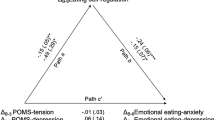Abstract
The present study compared the relative effectiveness of a therapist-supported maintenance condition with a minimal contact maintenance condition in preventing relapse following an obesity treatment program. Thirty-two subjects who completed an initial 12-week cognitive/behavioral plus aerobic exercise treatment program were matched on absolute weight loss and randomly assigned to one of two maintenance conditions. Subjects were assessed at pretreatment, posttreatment, and 3, 6, and 12 months following posttreatment using measures of weight, blood pressure, and depression. Three- and six-month follow-up results indicated that subjects who participated in the therapist-supported maintenance group continued to lose weight and/or maintained therapy-induced weight loss to a greater degree than control subjects. At the 12-month follow-up assessment therapist-supported subjects maintained therapy-induced weight loss better than the control subjects. These findings suggest that maintenance programs which provide continued contact emphasizing relapse prevention training may be an important adjunct in the maintenance of therapy-induced weight loss.
Similar content being viewed by others
References
Ashby, W. and Wilson, G. (1978). Behavior therapy for obesity: Booster sessions and long-term maintenance of weight-loss.Behav. Res. Ther. 15: 451–466.
Baum, J. G. (1989). A slimming book with a hefty goal: A review of K. D. Brownell's “The LEARN Program for Weight Control.”Behav. Ther. 12: 11–12.
Brownell, K. D. (1982). Obesity: Understanding and treating a serious, prevalent, and refractory disorder.J. Consult. Clin. Psychol. 50: 820–840.
Brownell, K. D. (1987).The LEARN Program for Weight Control, University of Pennsylvania School of Medicine, Philadelphia.
Brownell, K. D., Heckerman, C. L., Westlake, R. J., Hayes, S. C., and Monti, P. M. (1978). The effect of couples training and partner co-operativeness in the behavioral treatment of obesity.Behav. Res. Ther. 16: 323–333.
Foreyt, J. P. (1987). Issues in the assessment and treatment of obesity.J. Consult. Clin. Psychol. 55: 677–684.
Jeffery, R. W., Wing, R. R., and Stunkard, A. J. (1978). Behavioral treatment of obesity: The state of the art in 1976.Behav. Ther. 9: 189–199.
Kingsley, R. G., and Wilson, G. T. (1977). Behavior therapy for obesity: A comparative investigation of long-term efficacy.J. Consult. Clin. Psychol. 45: 288–298.
Marlatt, G. A., and Gordon, J. R. (1980). Determinants of relapse: Implications for the maintenance of behavior change. In Davidson, P. O., and Davidson, S. M. (eds.),Behavioral Medicine: Changing Health Life-Styles, Brunner/Mazel, New York, pp. 410–452.
Metropolitan Life Insurace Company (1959). New weight standards for men and women.Stat. Bull. 40: 1–4.
Perri, M. G., McAdoo, W. G., Spevak, P. A., and Newlin, D. B. (1984a). Effect of multicomponent maintenance program on long term weight-loss.J. Consult. Clin. Psychol. 52: 480–481.
Perri, M. G., Shapiro, R. M., Ludwig, W. W., Twentyman, C. T., and McAdoo, W. G. (1984b). Maintenance strategies for the treatment of obesity: An evaluation of relapse prevention training and posttreatment contact by mail and telephone.J. Consult. Clin. Psychol. 52: 404–413.
Perri, M. G., McAdoo, W. G., McAllister, D. A., Lauer, J. B., and Yancey, D. Z. (1986). Enhancing the efficacy of behavior therapy for obesity: Effects of aerobic exercise and a multicomponent maintenance program.J. Consult. Clin. Psychol. 54: 670–675.
Perri, M. G., McAdoo, W. G., McAllister, D. A., Lauer, J. B., Jordon, R. C., Yancey, D. Z., and Nezu, A. M. (1987). Effects of peer support and therapist contact on long-term weight loss.J. Consult. Clin. Psychol. 55: 615–617.
Stalonas, P. M., Perri, M. G., and Kerzner, A. B. (1984). Do behavioral treatments of obesity last? A five-year follow-up investigation.Addict. Behav. 9: 175–183.
Stunkard, A. J., and Penick, S. B. (1979). Behavior modification in the treatment of obesity: The problem of maintaining weight loss.Arch. Gen. Psychiat. 36: 801–806.
Wilson, G. T., and Brownell, K. D. (1980). Behavior therapy for obesity: An evaluation of treatment outcome.Adv. Behav. Res. Ther. 3: 49–86.
Author information
Authors and Affiliations
Additional information
This project was supported in part by the Florida Mental Health Institute of the University of South Florida 32446.
Rights and permissions
About this article
Cite this article
Baum, J.G., Clark, H.B. & Sandler, J. Preventing relapse in obesity through posttreatment maintenance systems: Comparing the relative efficacy of two levels of therapist support. J Behav Med 14, 287–302 (1991). https://doi.org/10.1007/BF00845456
Accepted:
Issue Date:
DOI: https://doi.org/10.1007/BF00845456




